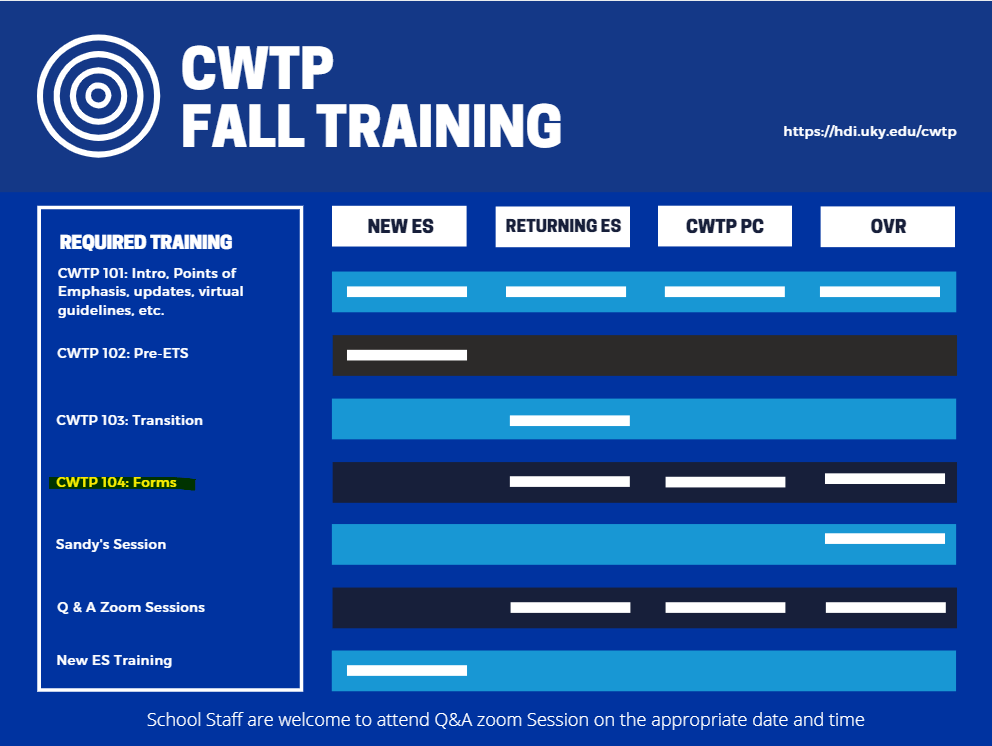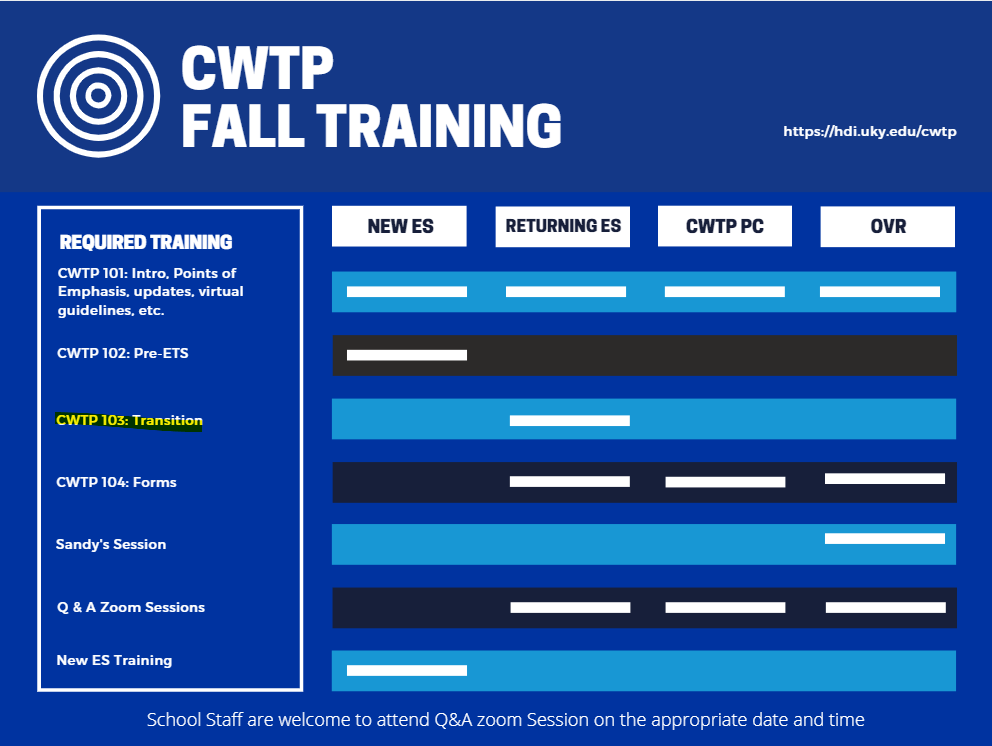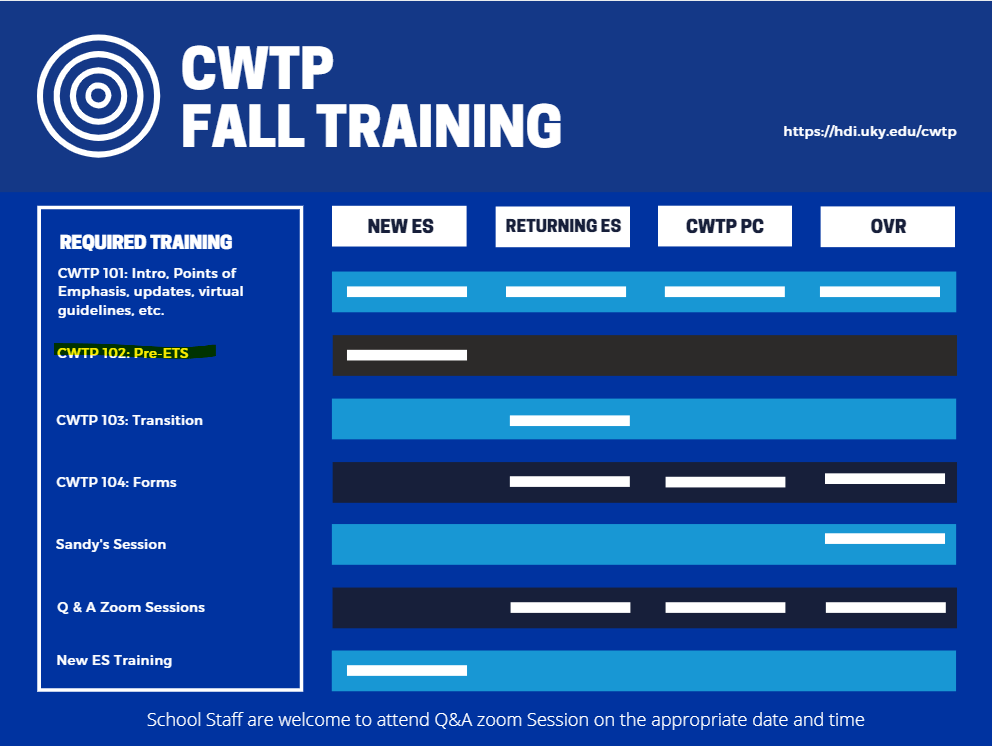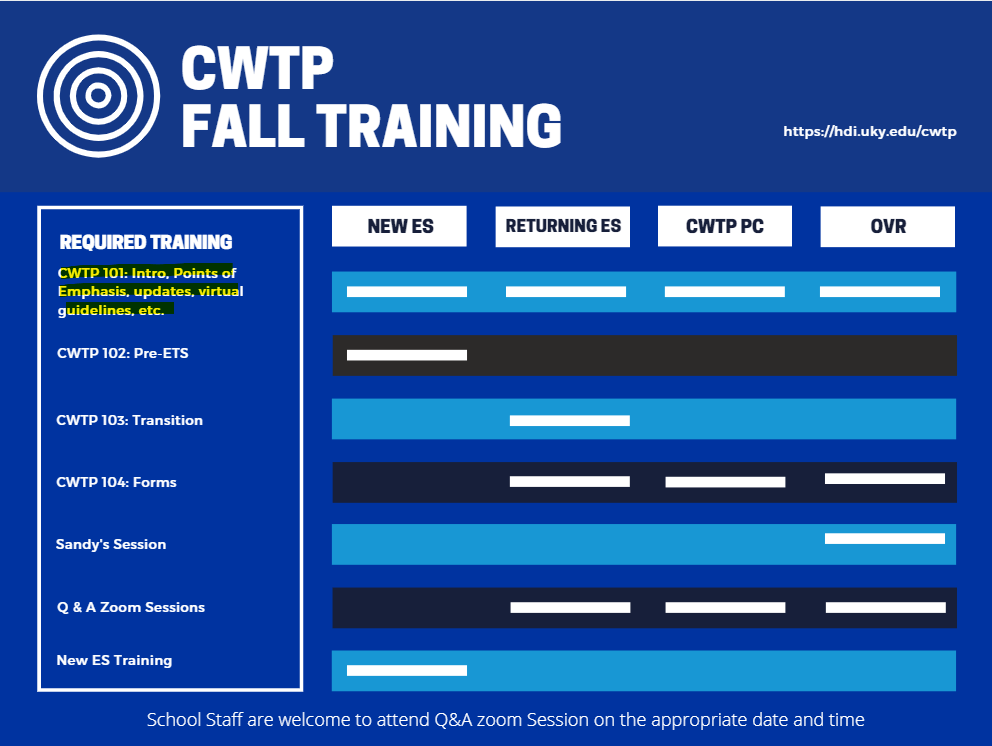The Department for Aging and Independent Living (DAIL) and the Kentucky Transportation Cabinet Office of Transportation Delivery (KYTC-OTD) have formed a partnership to provide accessible transportation to COVID-19 testing sites for individuals with disabilities. As a result of the completion of this module, you will understand the transportation supports available in Kentucky to get to a COVID-19 testing site.
Archives: Courses
EMP 105: Family Engagement (Professional Version)
? The goal of this course is to promote the vision that everyone can work and has talents and skills to share with the world if given the proper support, including youth with the most significant disabilities.

About this Course
- ? Check my Answer: these are activities to reflect on the question. Clicking Check my Answer will reveal the correct and incorrect answers.
- ? Audio: clicking the play button will play the recorded audio for the lesson or topic. The transcript for the audio is available under the player.
- ?Embedded Videos: Throughout the course there are videos from various YouTube channels. Many of these videos must be viewed in its entirety before moving on to the next topic.
- ?️ Legal: copied regulation or statute.
- This course is divided into Lessons and Topics. Each topic must be completed in order to move to the next Lesson.
- A graded quiz to check your understanding of the topic(s) covered. Quizzes are complete when 80% of the questions are answered correctly. You may take the Check Your Knowledge and Final Course quizzes multiple times until 80% is achieved.
- Questions? Use the Contact Us button below.
Photo Credit: Photo Credit: Kentucky Employment Files, Kristi – J. Barrett’s Hair School Nicholasville, KY
Course developed by KentuckyWorks, funded by the US Administration on Intellectual and Developmental Disabilities, Administration for Community Living.
ECE 010 Early Care Orientation Online–ECOOL (v. 2021)

This online course fulfills the mandatory 6-hour orientation requirement for early care and education professionals in Kentucky.
Orientation training consists of three lessons:
- Health, safety & sanitation – 2 hours
- Includes mandatory First Aid and CPR Training
- Recognizing and reporting child abuse and neglect – 1 hour
- Recommended practices in early care and education – 3 hours
Learners should have access to a printer for copies of supplemental handouts and other information that they may want to keep.
All activities must be completed in all three modules for a certificate to be awarded. Except for non-graded activities (NG); which pertain to your experiences or your work environment, activities must be completed at 80% or better correct rate. Activities may be redone until at least 80% correct is achieved.
Upon successful completion of the course, a Recognition of Course Completion will display within the course. In addition, your personal training record will be updated in ECE-TRIS within 10 days.
ECE-TRIS Registry: Kentucky’s Early Childhood Education Training Records Information System (ECE-TRIS) is a centralized database that tracks and stores individual training records. As a new early care and education professional please be sure to set up an account in ECE-TRIS so that all of your training hours are tracked through this system. To register, complete the ECE-TRIS Personal Information Form. This form should be faxed or mailed into the address listed on the form, or submitted online in the course.
Target Audience: early care and education professionals in Kentucky.
Hours: 6, early care and education
Prepared4ALL: Whole Community Inclusive Emergency Planning
This course is designed to increase your knowledge about whole community emergency planning, including COVID-19 planning, as well as provide you the basic information needed to connect with your own local emergency planners, public health professionals, and community.
In the course you will take on the role of “Terrye Trainee,” from Tornado Gap County, USA. Terrye is a professional from Tornado Gap’s local disability organization, Access & Equity, Inc. Tornado Gap’s county government and local disability and other community organizations want to collaborate to identify and close emergency planning gaps related to people with disabilities, chronic and mental health conditions. Terrye has heard about Disasterville’s inclusive emergency planning success and is visiting neighboring Disasterville to learn from their work.
After arriving in Disasterville you will hear from Disasterville’s professionals and community members and assist them with whole community inclusive emergency planning. You’ll learn about the Prepared4ALL process for local emergency planning collaboration. Local emergency and public health preparedness planners, the ADA Coordinator, and others from Disasterville will talk about what local planners may not know about people with disabilities. They’ll explain Prepared4ALL Action teams, how to hold Active Planning meetings, and how the U.S. local emergency planning system works.
As you meet Disasterville professionals and community members, you will be asked to make decisions and answer questions to check your learning about inclusive and accessible local emergency planning. You must complete all 8 lessons to earn a Prepared4ALL Certificate of Completion.
If you need tech support help, please scroll to the bottom of the page and select the “Contact Us” button and a team member will reach out to you for assistance within one business day.
All characters, locales, businesses, and other entities appearing in this training course are fictional. Any resemblance to real persons, whether living or dead, real locales, businesses and other entities is purely coincidental. The content and materials for this course are for informational purposes only and are not to be considered legal or medical advice. For legal advice please consult an attorney and for medical advice please consult a healthcare provider.
This project was funded through cooperative agreement CDC-RFA-OT18-1802 by the Disability and Health program. The content is solely the responsibility of the awarded organization and does not necessarily represent the official views of the CDC or the U.S. Department of Health and Human Services.
Click the first lesson below to continue. If you do not see the option below to select the first lesson, please be sure you have created a user account and are logged in.
Plain Language
TAALC 101: Listen Up Series (4.5 hours)
The TAALC Modules and Webinars below have been created by the Low Incidence Initiative-Teaching Academic Age-appropriate Learning via Communication (TAALC) program. The underlying premise of TAALC is all students can and do communicate, and TAALC presentations are designed to provide training and experience in identifying communicative competence for students with complex communication needs. The Listen UP series of modules was created to equip school teams and families with the skills needed to increase a student’s communicative competence.
Training Goals
Through video examples we will help you learn how to:
- Recognize communication in students with complex communication needs
- Implement strategies for change for students with complex communication needs
- Understand factors that can limit communication
- Foster early communication with Alternative and Augmentative Communication
- Utilize effective teaching behaviors
- Provide access to the curriculum by including communication throughout the day, and
- Address communication implications for challenging behavior.
CWTP: Sandy’s Session
FET 4: Levels of Evaluation & Transfer of Learning
In this course, you will learn more about the four Levels of Evaluation, and complete and submit the Evaluation Plan that you started during FET 3, as well as the closing section of your Training Plan.
You will submit an implementation plan assignment that will help you set personal goals for yourself as you continue to grow and develop as a trainer.
FET 3: Group Training Days (Virtual)
Fundamentals of Effective Training:
Virtual Training Sessions
Thank you for your flexibility in joining us virtually for our group training day!!! We look forward to “meeting you!”
There are two dates for the virtual sessions and you must attend both sessions.
Between the sessions, there will be an assignment for you to work on and turn in. This assignment will involve creating a training plan. Training Coaches are availble for questions in between the sessions should you need some additional assistance.
If you have difficulty connecting to the group training day please contact Christine Hausman at 859-519-0401.
Tuesday, Feb 6th – Group Training Day 1 (Required)
Tech check in: 9:15 – 9:30 am (Eastern Standard Time)
Session time: 9:30 – 11:30 am (Eastern Standard Time)
Join from PC, Mac, Linux, or mobile device: https://uky.zoom.us/j/81012590581
In preparation for the group training session you will need:
- Your COMPLETED needs assessment & training plan worksheet assignments from FET 2, either printed out or accessible on the computer.
- Access to the Professional Development Framework (PDF) either printed out or accessible on the computer.
(We will review Core Content Subject Areas and will be using the PDF during a practical exercise.) - Blank Training Plan for our Group Work
Friday, Feb 9th – Group Training Day 2 (Required)
Tech check in: 9:15 – 9:30 am (Eastern Standard Time)
Session time: 9:30 – 11:30 am (Eastern Standard Time)
Join from PC, Mac, Linux, or mobile device: https://uky.zoom.us/j/81012590581
In preparation for the group training session you will need:
In preparation for the group training session #2 answer the following questions:
- Was working on the Training Plan Project harder or easier than you thought it would be?
- What areas did you find you needed to focus on more?
- What questions do you have, thus far, about the Training Plan portions you’ve completed?
If you have additional questions, feel free to contact your Training Coach or Christine Hausman via e-mail: christine.hausman@uky.edu.
FET 2: Training Design
In this course, you will learn about the Professional Development Framework (PDF) that includes the key components to address the needs for Education, Training, and Credentialing of Early Care, Early Intervention, and Early Childhood Education professionals in Kentucky.
Prior to starting the first lesson in this course you should have access to the Professional Development Framework. It will be utilized throughout FET. Please note this document is 93 pages. If you do not have a pre-printed copy already, you have the option of printing it out or downloading the document for future reference.
FET 1: Effective Trainers, Adult Learners, and Learning Environments
Welcome to the Fundamentals of Effective Training (FET)!
FET is a hybrid training that consists of several sections of online content, plus 1 face to face training day OR 2 webinar training days, followed by an additional section of online content. (See FET 3 for information about your in person day or webinar dates). All sections must be completed in order, as this training is sequential, building on content from each previous section. The learning management system is set up to let you progress to the next section once you have completed the necessary prior assignment. FET is designed for flexibility, allowing you to work as your schedule permits and saving your work as you go.
It is important to start working through the courses as soon as they open and complete by the designated due date. This will allow you to pace yourself and move through the content at a comfortable rate. The time it takes to complete each course may vary for each participant due to previous experience with the content and/or their level of comfort with online training.
Each Course in FET will have a ‘Course Content’ table below its home page. Please start each course by clicking the first lesson.
CWTP 104: Forms

You are here ➡️ CWTP 104: Forms
This course is required for:
To begin, click on the first lesson below.
CWTP 103: Transition

You are here ➡️ CWTP 103: Transition
This course is required for:
To begin, click on the first lesson below.
CWTP 102: Pre-ETS

You are here ➡️ CWTP 102: Pre-ETS
This course is required for:
To begin, click on the first lesson below.
CWTP 101: Introduction

You are here ➡️ CWTP 101
CWTP 101 is required for everyone! To begin, click on the first lesson below.
ECE 107: External Transitions – Resources and Supports in Child Care Settings (2 hours)
ECE 107: External Transitions – Resources and Supports in Child Care Settings
ECE 107 is the fourth module in a series dedicated to the challenges, impacts, and prevention of suspension and expulsion in child care settings. This module focuses on practical applications of prevention strategies which will help increase the threshold for decision-making regarding the necessity of external transitions for children, with the intention of reducing or eliminating suspension and expulsion in child care settings.
This course builds upon the content of ECE 101, 102, and 103 by:
- Communicating information on the structure of supports available to Kentucky child care providers which promote the ability for teachers, program administrators, and other caregivers to address behavior challenges in child care settings.
- Promoting changes in practice which positively impact individual and/or group behavior in child care settings.
- Connecting providers with state and national resources to support positive behavior and healthy child development in child care settings.
Other courses in the External Transitions series
ECE 101: External Transition – Suspension & Expulsion – Impacts on Children and Families
In ECE 101 participants learned about the impacts of external transitions on children; the impact of a disruption of continuity in early childhood settings; the impact of Adverse Childhood Experiences on brain functioning and cognitive development; and, the role early care and education settings play in mitigating the long term impacts of stress and trauma for children.
External Transition 102: Suspension and Expulsion – Programmatic Impacts
ECE 102 reviewed challenges Kentucky families and children face regarding continuity of care; program availability and access; the impact that stable, nurturing relationships play in child development; and, the influence of implicit bias in decision-making regarding suspension and expulsions in early care and education settings.
External Transition 103: Suspension & Expulsion – Prevention, Intervention, and Evidence-Based Practices
ECE 103 took a deeper dive into the impact of suspension and expulsion on families and on child care businesses. The content explored the role that policy and access to resources beyond the child care setting can have on reducing the number of suspensions and expulsions children experience. This module also provided a brief overview of strategies for developing and maintaining high-quality programming in conjunction with options for individualized and classroom-based intervention plans.
Course Details

Target Audience
All Staff

Learning Environment
Infant Toddler
Preschool
School Age

Training Level
1
Core Content Subject Areas
- Professional development/professionalism
- Program management and evaluation
Core Content Competencies
- Participate in professional development (i.e., credentials, degrees) as required for each level to improve performance and to expand personal knowledge of child development, interdisciplinary practices, and family-centered services.
- Adhere to program policies and regulations and assist with maintaining individual child records.
FET 375 Beyond Fundamentals: Engaging Participants’ Minds as Well as Their Bodies Using Total Participation Techniques (2 Hours)
Course Overview
- Course will take approximately 2 (two) hours to complete
- Upon successful completion participants will be awarded 2 how to train other adults training hours
- Audience: Early Care and Education Trainers
Course Description
When we think of engaging participants, we usually think of engaging them in activities. This session will focus on strategies for using Total Participation Techniques (TPTs) that allow all participants to demonstrate, at the same time, active participation and cognitive engagement in the topic being studied. Throughout this training session trainees will learn what TPT’s are, how they can be used to support participation and engagement, and be provided tools to implement TPT’s into future trainings.
This training session includes active participation and requires satisfactory completion of an application activity in order to successfully complete the training.
Course Facilitator
April Brown
Training Coach – The Lakes Region
If you encounter technical issues with the site, please use the “Contact Us” button at the bottom of the page.
Training Outcomes
- Identify what participation and cognitive engagement are and their importance.
- Describe the Ripple approach to engagement.
- Identify examples of Total Participation Techniques.
- Implement Total Participation Techniques into trainings.
Workplace Outcomes
Participants will engage all trainees at the same time and encourage deeper cognitive engagement by incorporating Total Participation Techniques (TPTs) into 1 (one) training.
Important Information!
This course requires satisfactory completion of an application activity prior to course being fully complete. All application activities can take up to 3 business days to review. The completion date for the course is the date that the application activity is satisfactorily completed. Once completed satisfactorily you will have the ability to print a certificate with the completion date and credit will be entered into ECE-TRIS within 10 calendar days.
If you are approaching your credential expiration, it is recommended to have all coursework completed and submitted with your renewal application 30 days prior to your expiration. This allows ample time for course feedback and resubmissions of assignments is necessary. Please reach out to the course facilitator if you have any questions.
PHT 206: Understanding Disability and Best Practices for Communicating a Diagnosis
Course Sponsored by: Lettercase National Center for Prenatal and Postnatal Resources at the University of Kentucky’s Human Development Institute
We have no conflicts of interest to disclose.
The overarching purpose is to give genetic counselors tools to assess the administration of genetic screening and testing in the context of the disability rights movement, to recognize what constitutes balanced information, and to promote culturally competent practice as well as client-centered, informed, non- coercive and value-based decision-making.
The National Society of Genetic Counselors (NSGC) has authorized Lettercase National Center for Prenatal and Postnatal Resources to offer up to 0.5 CEUs or 5 Category 1 contact hours for the activity Understanding Disability and Best Practices for Communicating a Diagnosis.The American Board of Genetic Counseling (ABGC) will accept CEUs earned at this program for the purposes of genetic counselor certification and recertification. These objectives map to the Accreditation Council of Genetic Counseling (ACGC) Practiced Based Competencies 2a, 11a &b, 13a) (2019), as well as the NSGC Code of Ethics (I1, II4&5, IV4) (2017).
Learning Objectives
- Examine how the basic history of disability rights has impacted life outcomes for people with disabilities and the importance of recognizing current supports, services, and life outcomes when communicating about prenatal screening and testing for genetic conditions.
- Critically assess policies and practices that impact the provision of genetic information at the moment of diagnosis of a genetic condition.
- Define best practices for discussing prenatal screening and testing and delivering a prenatal or postnatal diagnosis of Down syndrome with accuracy, sensitivity, and cultural awareness.
This course was developed by
- Dr. Harold Kleinert, EdD
- Stephanie Meredith, MA
- Supervisor: Angela Trepanier, MS, CGC
Course Support
Support is available by clicking Contact Us on any page within the course.
HDI-Tech 103: Technology for Accessible Online Meetings & Technology

The Human Development Institute provides technical support through its Center for Assistive Technology (CATS) and tech team. This online course is support for our partners to understand how to hold online, accessible meetings.
SUD 201: Employer Training on Substance Use Disorders
This training for employers provides information and resources to identify and support employees with substance use disorders (SUD). Participants will learn ways to create an environment that minimizes the impact of SUD on the workplace, while reducing stigma and barriers to successful treatment for employees.
Preparation of this item was fully funded by the United States Department of Labor, Office of Disability Employment Policy in the amount of $3.5 million under Cooperative Agreement No. OD-32548-18-75-4-21. This document does not necessarily reflect the views or policies of the U.S. Department of Labor, nor does mention of trade names, commercial products, or organizations imply endorsement by the U.S. Government.

